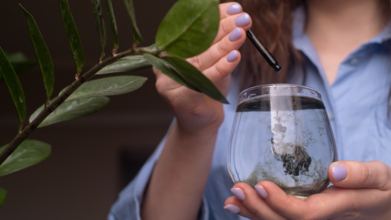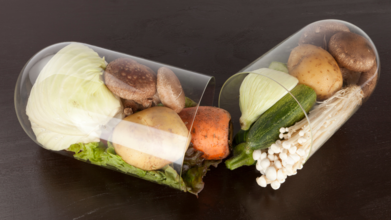- Health Conditions A-Z
- Health & Wellness
- Nutrition
- Fitness
- Health News
- Ayurveda
- Videos
- Medicine A-Z
- Parenting
- Web Stories
Here's All That You Need To Know About The Atkins Diet

Credits: Canva
While there exists many kinds of diets, there is not one best suited for everyone. Every diet is different and so is every body type. However, if you are someone who is looking for a low-carb diet, then you may be interested in trying the Atkins Diet. This is primarily recommended for weight loss. Those who promote this diet claim that individuals can lose weight while eating unlimited amounts of protein and fat and leaving out the carbohydrates.
Since the early 2000s, there have been various studies conducted that suggest that low-carb diets can be effective for weight loss without requiring calorie counting. These diets have also been linked to improvements in several health markers, including blood sugar levels and cholesterol.
Origin
The Atkins diet was originally developed by Dr Robert C Atkins, who was a physician. He introduced this eating plan in his 1972 best-selling book. Over the years, this diet has gained widespread popularity, and numerous books have been also written about it.
Initially, the diet was criticized. The major criticism came because of the high saturated fat content, which was believed to be unhealthy. However, research on the effects of saturated fat, especially in relation to heart disease, has been mixed, and the topic remains a subject of scientific debate.
The Saturated Fat Debate
The role of saturated fat in heart disease has been extensively studied. According to a review by the American Heart Association (AHA), replacing saturated fat with polyunsaturated fat may reduce the risk of cardiovascular disease by approximately 30%. Other studies also suggest that replacing saturated fats with healthier fats could lower the risk of heart attacks and strokes.
However, some research has found no significant connection between reducing saturated fat intake and a lower risk of cardiovascular disease. Some experts argue that overall diet quality is more important than focusing on individual nutrients.
Compared to other diets, the Atkins diet and other low-carb approaches have been found to result in more weight loss and greater improvements in blood sugar control, HDL (good) cholesterol levels, and triglycerides than low-fat diets. However, some research indicates that low-carb diets may raise LDL (bad) cholesterol, although the degree of increase varies between individuals.
The Four Phases of the Atkins Diet
The Atkins diet consists of four phases:
Phase 1 (Induction): For two weeks, carbohydrate intake is limited to under 20 grams per day. This phase encourages eating high-fat and high-protein foods along with low-carb vegetables like leafy greens.
Phase 2 (Balancing): Gradually, nuts, low-carb vegetables, and small amounts of fruit are reintroduced.
Phase 3 (Fine-tuning): As individuals get close to their target weight, they can increase their carbohydrate intake until weight loss slows.
Phase 4 (Maintenance): At this stage, individuals determine how many carbs they can eat without regaining weight.
Some people modify these phases based on personal preferences. For example, some may skip the induction phase and include a variety of fruits and vegetables from the start, while others may choose to follow a very low-carb ketogenic (keto) diet indefinitely.
Foods to Avoid on the Atkins Diet
The Atkins diet restricts or limits the following foods:
- Sugar: Found in soft drinks, fruit juices, cakes, candy, and ice cream.
- Refined grains: Such as white bread, white rice, and white pasta.
- Diet and low-fat foods: Many of these products contain added sugars.
- High-carb fruits: Bananas, apples, oranges, pears, and grapes (restricted in the induction phase).
- Starchy vegetables: Potatoes and sweet potatoes (restricted in the induction phase).
- Legumes: Lentils, beans, and chickpeas (restricted in the induction phase).
Foods to Eat on the Atkins Diet
The Atkins diet encourages consumption of:
- Meats: Pork, lamb, chicken, and bacon.
- Fatty fish and seafood: Salmon, trout, sardines, and mackerel.
- Eggs: Preferably omega-3 enriched or pastured eggs.
- Low-carb vegetables: Kale, spinach, broccoli, and asparagus.
- Full-fat dairy: Butter, cheese, cream, and full-fat yogurt.
- Nuts and seeds: Almonds, walnuts, macadamia nuts, and sunflower seeds.
- Healthy fats: Extra virgin olive oil, coconut oil, avocado, and avocado oil.
- Whole grains: Brown rice, oatmeal, bulgur, quinoa, and teff (in later phases).
Meals should be centered around a high-fat protein source, along with vegetables, nuts, and healthy fats. Complex carbohydrates can be included in moderation based on individual carb tolerance.
Beverage Choices on the Atkins Diet
- Water: The best choice for hydration.
- Coffee: Rich in antioxidants and may offer health benefits.
- Green tea: Contains beneficial antioxidants.
- Alcohol: Allowed in small amounts. Dry wines are preferred, while high-carb drinks like beer and sugary cocktails should be avoided.
Following Atkins as a Vegetarian
Vegetarians and vegans can adapt the Atkins diet by emphasizing plant-based fat and protein sources. Healthy fats should make up about 43% of their intake, coming from avocados, nuts, seeds, olive oil, and coconut oil. Protein sources can include tofu, soy products, and legumes (in later phases). Lacto-ovo vegetarians can also consume eggs, cheese, and other dairy products.
Planning Meals on the Atkins Diet
To stay on track with the Atkins diet:
- Plan weekly menus: Preparing meals in advance can help maintain consistency.
- Make a shopping list: Choose the least processed options that fit your budget.
- Include snacks: Keep low-carb snacks available to avoid unhealthy temptations.
- Be mindful when eating out: Opt for extra vegetables instead of bread or rice, and request additional healthy fats like butter or olive oil.
Potential Risks of the Atkins Diet
While the Atkins diet may promote weight loss, it also comes with potential risks, particularly in the early stages. Possible side effects include:
- Headache
- Dizziness
- Fatigue
- Weakness
- Constipation
- Low blood sugar
- Kidney issues
- Electrolyte imbalance
Additionally, restricting carbohydrates may result in insufficient fiber intake, which is crucial for gut health and disease prevention. Some research suggests that high-fat diets could negatively impact gut bacteria, potentially increasing the risk of cardiovascular disease.
Do TikTok’s Trending Supplement 'Chlorophyll & Collagen' Drink Really Work?

Credits: iStock
Step into a health shop, swipe through TikTok, or wander through beauty stores, and there it is, a familiar promise: powders, pills, or drops to reveal radiant skin, cleanse the body, or even reverse aging. Two of the biggest players in this wellness wave are chlorophyll—the green pigment in plants now bottled into tinctures and waters and collagen, a structural protein sold as the ultimate anti-aging fix.
On social media, celebrities and influencers sip on green shots or blend collagen into coffee, packaging them as the shortcut to health and beauty. But does the science hold up, or is it more about clever marketing dressed up in glossy branding?
Chlorophyll is the pigment found in plants that makes them green. In biology lab, it's recalled as fueling photosynthesis—to capture light energy to create glucose and oxygen. In plants, it's vital. In humans, things aren't quite as simple.
Wellness brands and influencers, from Gwyneth Paltrow's Goop to Kourtney Kardashian Barker's Poosh, have made drinking chlorophyll water a daily habit. Marketing promises range from detoxification to more radiant skin and even "oxygenating the blood." The concept sounds alluring—except that it can't be done biologically.
As physician and researcher Ben Goldacre points out, photosynthesis requires sunlight, water, and carbon dioxide. Our gut and bloodstream aren’t flooded with sunlight, so chlorophyll simply can’t perform its plant-like function inside humans. Drinking it won’t generate oxygen in your body.
What is The Trend Promoting Chlorophyll Supplement?
The type most commonly employed in supplements is chlorophyllin, a semi-synthetic, water-soluble derivative of chlorophyll. Several small, older studies indicate that it might decrease odors in wounds or stool, possibly by breaking down some compounds or stopping bacteria from growing. There's weak evidence that it might act as an antioxidant, roaming free radicals causing cell destruction, but studies are few and far from convincing.
More promising are investigations into its application in wound healing. Chlorophyll dressings have been studied for their potential to speed up healing and deodorize infected wounds. But consuming it for beauty or detoxing purposes is something else—clinical evidence for those uses is scant.
Potential Risks and Side Effects of Chlorophyll
Most individuals are able to tolerate chlorophyll, but it is not risk-free. Side effects reported include diarrhea, cramps in the stomach, and colored urine, stool, or even tongue. Mild itching or burning with topical use can be produced in occasional instances. The U.S. National Library of Medicine states that chlorophyll is non-poisonous in normal doses, but in high doses it can produce gastrointestinal upset.
What this actually translates to is that while chlorophyll won't hurt you in moderation, it's also unlikely to bring the extreme makeovers promised on TikTok.
Collagen
Collagen differs from chlorophyll in that it's something that humans naturally create. It's the body's most common protein and what builds scaffolding for skin, bones, cartilage, blood vessels, and connective tissue. It's responsible for skin elasticity and flexibility of joints.
Collagen production inherently decreases with age, resulting in wrinkles, stiff joints, and less resilient connective tissue. This loss has propelled a billion-dollar collagen market, with powders, pills, and creams touted as a means to "replenish" what the body is losing.
What Science Says About Collagen Supplements
Collagen supplementation research is further advanced than chlorophyll's, although it's not yet conclusive. Some research indicates oral collagen peptides can moderately enhance skin hydration, elasticity, and fine lines. There's also support that they might be good for joint health, mitigate exercise-induced joint pain, and increase bone density in the elderly.
But science doesn't go so far as to make miracle promises. Collagen won't cause weight loss, detox the body, or stop cardiovascular disease, no matter what ads might promise.
Topical Collagen
Collagen creams and serums inundate the beauty market, but it's hard to find one that works. Collagen molecules are too big to pass through the skin barrier, so most topical products can't really increase collagen where it counts. At best, they offer surface moisture and temporary plumping.
Supporting Natural Collagen Production
The body synthesizes collagen from amino acids, so consuming sufficient protein-containing foods—chicken, fish, eggs, beans, and bone broth—is still the best method to supply it. Vitamin C, zinc, and copper are also necessary cofactors for collagen production. Having a well-nourished diet and staying away from excessive sunlight exposure and smoking might preserve your natural reserves better than any costly powder.
Why TikTok Supplements Feel So Convincing?
One of the reasons supplements such as chlorophyll and collagen do so well online is that they provide instant, tangible rituals. Adding green drops to water or spilling white powder into a latte gives one a feeling of agency and pampering. When influencers couple such rituals with radiant skin or lean bodies, it's simple to think that the supplement is the magic bullet—when genetics, diet, and lifestyle actually have so much more to do with it.
Social media exaggerates anecdotal accounts, frequently beating what the evidence will allow. And although both collagen and chlorophyll might have specialized advantages, they are not cure-alls or substitutes for healthy living.
What Consumers Should Know?
Experts always recommend taking supplement fads with a grain of salt. The evidence for chlorophyll remains limited, with only mild effects in very particular medical contexts such as wound healing. Collagen is more robust, especially for joints and skin, but the effects are modest compared to what is claimed in the marketplace.
Supplements must be used to complement, and not substitute, a diet of balanced nutrition, exercise, and sleep. For beauty and health in the long run, consuming a diet that has high quantities of fruits, vegetables, protein, and micronutrients is a much better way than consuming any one powder or extract.
Is Chlorophyll Drink Worth the Hype?
Chlorophyll won't make you a detoxed, glowing version of yourself any more than photosynthesis will function in your blood. Collagen supplements might be helpful, particularly for skin and joints, but they're no miracle cure themselves.
For the time being, consider these TikTok staples as add-ons, not requirements. If drinking a chlorophyll latte makes you happy or sprinkling collagen powder makes you eat more protein, that's okay. Just be aware that the glow-up is much more likely to be the result of regular healthy habits and not an online-viral supplement.
Disclaimer: This article is intended for informational purposes only and is not a replacement for medical professional advice. Always consult a qualified healthcare professional before starting supplements, treatment, or altering your health regimen.
Wednesday's Jenna Ortega Eats Kiwi With The Skin On - Is That Healthy, Doctor Weighs In

(Credit-Jennaortega/Instagram)
Jenna Ortega, known for playing the beloved Addams Family character Wednesday, recently posed a video exclaiming how she ‘recently’ found out you can eat kiwis with its skin on, which has sparked a great deal of conversation about whether it is healthy or not.
We are all used to either cutting out the fuzzy skin of kiwis or cutting it in half and scooping out the soft fruit flesh from the inside. However sometimes, just because we are used to something, doesn’t mean it is right. For a long time, peeling fruits was a norm and people thought it was necessary to do, to be safe. However, recently we have seen more scientific proof of why these fruit peels is not only edible but have hidden benefits.
Weighing in on this conversation gastroenterologist Dr. Joseph Salhab and registered dietitian Gillian Culbertson posted a video explaining how this is actually a good practice.
Can You Eat Kiwi With Skin On?
Eating the kiwi skin can significantly boost the fruit's nutritional power. Dr Salhab and Culbertson explain that the skin is loaded with
More Fiber
Eating the skin increases the kiwi's fiber content by up to 50%. This is great for your digestive system, helping to prevent constipation and support a healthy gut.
More Vitamins
You'll get more vitamin C and vitamin E, which support liver health and your immune system. The skin also adds extra folate, magnesium, and vitamin B6.
Rich in Antioxidants
The skin contains three times more antioxidants than the fruit itself. These include polyphenols and vitamin C that fight inflammation and help protect your cells from damage.
What Are The Benefits of Kiwi Skin?
According to the Cleveland Clinic, eating kiwi, especially with the skin on, offers other notable health perks:
- Eating a kiwi two hours before bed can help your body produce melatonin, a hormone that regulates sleep, leading to a better night's rest.
- The fiber and antioxidants help protect the colon from DNA damage, which can lower your risk of colon cancer.
What Are the Risks of Having Kiwi Skin?
While kiwi skin is packed with nutrients, it's not for everyone. If you have a history of kidney stones, you should avoid eating the skin. The skin contains high levels of oxalates, which are natural substances that can bind with calcium in your body. This can lead to the formation of crystals in your kidneys, increasing your risk of developing painful kidney stones. It's much safer for you to simply enjoy the fruit on its own and throw away the skin. If you're ever in doubt, it's always best to check with your doctor first.
Tips for Eating Kiwi Skin
If the idea of eating a kiwi with its fuzzy skin doesn't appeal to you, don't worry—you have options.
Try a Golden Kiwi
The golden kiwi has a smooth, fuzz-free skin that's much easier to eat than its green counterpart.
Scrub the Fuzz Off
For green kiwis, you can gently scrub the skin with a kitchen towel or vegetable brush while rinsing it under water. This will help remove the fuzzy texture and make it more pleasant to eat.
Blend It
The easiest way to get all the benefits of the skin without even noticing it is to throw a whole kiwi into a smoothie. The blender will break the skin down into tiny, unnoticeable pieces.
Nutritionist Explains Why Relying On Supplements Alone Is Not Enough

Credits: Canva
When it comes to health, there are no magic shortcuts. “Health is cultivated daily, in small, consistent ways,” said celebrity nutritionist Rujuta Diwekar on the episode of All About Her, a podcast hosted by Soha Ali Khan that focuses on women’s nutrition and wellness. Diwekar explained why supplements alone can never replace the essentials of good health, home-cooked food, quality sleep, daily movement, and mindful living.
Supplements Should Complement, Not Replace
According to Diwekar, supplements can only serve their purpose when they are built on top of a strong foundation of healthy habits. Relying solely on pills, powders, or protein shakes while neglecting real food, exercise, and rest does more harm than good. “If your entire focus is on products at the cost of eating home-cooked food, working out, and sleeping well, then it’s not worth it,” she said. Supplements should be seen as supportive tools, not substitutes.
Fitness Doesn’t Need To Be Expensive
A common misconception is that fitness requires costly gym memberships, imported superfoods, or a stack of supplements. Diwekar challenged this belief, stressing that true health is rooted in affordable, sustainable choices. Eating local, seasonal produce and sticking to consistent routines are far more effective than chasing expensive quick fixes. In her words, wellness becomes accessible when we look at what’s around us rather than what is marketed to us.
The Influence of Social Media Trends
The growing culture of influencers promoting supplements was another concern Diwekar highlighted. Many online personalities push powders, pills, and products without disclosing paid partnerships, leaving followers misinformed. This often leads people to buy into the illusion of quick results instead of cultivating habits that bring long-term benefits. Diwekar urged listeners to be cautious about influencer-driven trends and to prioritize their own health signals over marketing hype.
Holistic Health Goes Beyond Food
Nutrition is only one piece of the puzzle. Diwekar reminded her audience that sleep, stress management, and emotional well-being are just as crucial as what we put on our plate. A balanced lifestyle, where rest, relaxation, and movement align with nutrition, creates resilience and lasting wellness. Short-term fads may show quick results, but consistency is the true marker of good health.
Listening To Your Body
Another key takeaway was the importance of tuning into one’s own body. Recognizing signals of hunger, satiety, and energy levels helps individuals build routines that suit their unique needs. Diwekar emphasized that no one-size-fits-all diet or supplement plan can replace personal awareness. Paying attention to your body’s cues is far more effective than blindly copying celebrity-endorsed diets or social media challenges.
Ultimately, Diwekar’s advice blends practicality with tradition. Wellness doesn’t require radical changes, it’s about making small, sustainable choices every day. Cooking at home, walking regularly, choosing local ingredients, and prioritizing sleep are habits that make health achievable for everyone. Supplements can support this lifestyle, but they should never be the foundation.
© 2024 Bennett, Coleman & Company Limited

